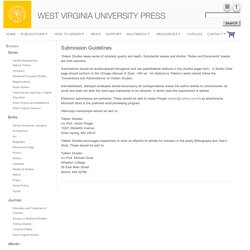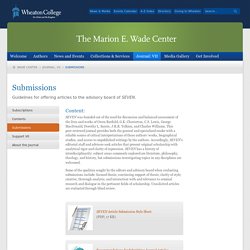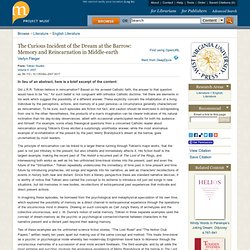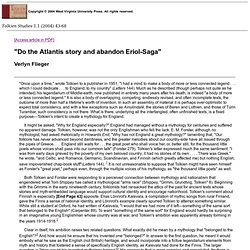

West Virginia University Press. Tolkien Studies seeks works of scholarly quality and depth.

Substantial essays and shorter, “Notes and Documents” pieces are both welcome. Submissions should be double-spaced throughout and use parenthetical citations in the (Author page) form. A Works Cited page should conform to the Chicago Manual of Style, 14th ed. All citations to Tolkien’s works should follow the “Conventions and Abbreviations” of Tolkien Studies.
Self-addressed, stamped envelopes should accompany all correspondence unless the author wishes to communicate via email and does not wish the hard-copy manuscript to be returned, in which case this requirement is waived. Electronic submissions are preferred. Hard-copy manuscripts should be sent to: Tolkien Studies c/o Prof. Tolkien Studies encourages researchers to send us offprints of articles for inclusion in the yearly Bibliography and Year’s Work. Submissions. SEVEN was founded out of the need for discussion and balanced assessment of the lives and works of Owen Barfield, G.K.

Chesterton, C.S. Lewis, George MacDonald, Dorothy L. Sayers, J.R.R. Tolkien, and Charles Williams. This peer-reviewed journal provides both the general and specialized reader with a reliable source of critical interpretations of these authors' works, biographical studies, and access to unpublished writings by the authors. Some of the qualities sought by the editors and advisory board when evaluating submissions include: focused thesis; convincing support of thesis; clarity of style; creative, thorough analysis; and interaction with and relevance to seminal research and dialogue in the pertinent fields of scholarship. A Companion to J. R. R. Tolkien - Stuart D. Lee. Project MUSE - Dream Visions in J.R.R. Tolkien's The Lord of the Rings. Project MUSE - The Curious Incident of the Dream at the Barrow: Memory and Reincarnation in Middle-earth.
The Curious Incident of the Dream at the Barrow: Memory and Reincarnation in Middle-earth In lieu of an abstract, here is a brief excerpt of the content: Did J.R.R.

Tolkien believe in reincarnation? Based on his avowed Catholic faith, the answer to that question would have to be "no," for such belief is not congruent with orthodox Catholic doctrine. Yet there are elements in his work which suggest the possibility of a different answer. The principle of reincarnation can be linked to a larger theme running through Tolkien's major works, that the past is not just tributary to the present, but also inhabits and immediately affects it.
In imagining these episodes, he borrowed from the psychological and metaphysical speculation of his own time, which explored the possibility of memory as a direct channel to extra-personal experience through the operations of the unconscious mind in dreams. Verlyn Flieger - "Do the Atlantis story and abandon Eriol-Saga" - Tolkien Studies 1:1.
"Once upon a time," wrote Tolkien to a publisher in 1951, "I had a mind to make a body of more or less connected legend . . . which I could dedicate . . . to England; to my country" (Letters 144).

Much as he described (though perhaps not quite as he intended) his legendarium of Middle-earth, now published in entirety many years after his death, is indeed "a body of more or less connected legend. " It is also a body of overlapping, competing, endlessly revised, and often incomplete texts, the outcome of more than half a lifetime's worth of invention. In such an assembly of material it is perhaps over-optimistic to expect total consistency, and with a few exceptions such as Ainulindalë, the stories of Beren and Lúthien, and those of Túrin Turambar, such consistency is not there. What is there, underlying all the intertangled, often unfinished texts, is a fixed purpose—Tolkien's intent to create a mythology for England. It might be asked, "Why for England especially? " (Lost Tales I 22) J.R.R. Tolkien's The Lord of the Rings: EBSCOhost.
85.17.122.176/bookreader.php/139008/The_Letters_of_J.RRTolkien.pdf.